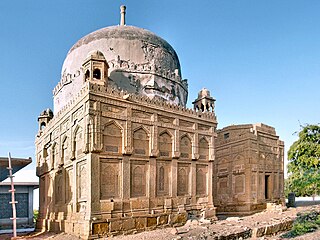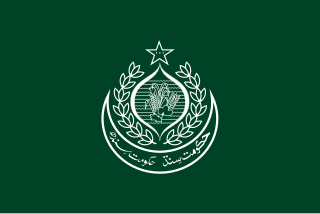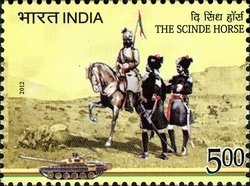
Sind was a province of British India from 1st April 1936 to 1947 and Dominion of Pakistan from 14 August 1947 to 14 October 1955. Under the British, it encompassed the current territorial limits excluding the princely state of Khairpur. Its capital was Karachi. After Pakistan's creation, the province lost the city of Karachi, as it became the capital of the newly created country. It became part of West Pakistan upon the creation of the One Unit Scheme.

General Sir Charles James Napier, was an officer and veteran of the British Army's Peninsular and 1812 campaigns, and later a Major General of the Bombay Army, during which period he led the military conquest of Sindh, before serving as the Governor of Sindh, and Commander-in-Chief in India.

Mirpur Khas is the capital city of the Mirpur Khas District and Mirpur Khas Division in the Sindh province, Pakistan. Mirpur Khas is the 6th largest city in Sindh province and the 34th largest city of Pakistan. The city was built by Talpur rulers of Mankani branch. According to the 2017 Census of Pakistan, its population is 233,916. Mirpur Khas is known for its mango cultivation, with hundreds of varieties of the fruit produced each year - it is also called the “City of Mangoes,” and has been home to an annual mango festival since 1955. After the completion of Hyderabad-Mirpurkhas dual carriage way, the city has become hub of commercial activities.

The North-West Frontier was a region of the British Indian Empire. It remains the western frontier of present-day Pakistan, extending from the Pamir Knot in the north to the Koh-i-Malik Siah in the west, and separating the modern Pakistani frontier regions of North-West Frontier Province, Federally Administered Tribal Areas and Balochistan from neighbouring Afghanistan in the west. The borderline between is officially known as the Durand Line and divides Pashtun inhabitants of these provinces from Pashtuns in eastern Afghanistan.
Agra or AGRA may refer to:
Shah Nawaz Bhutto, was a politician and a member of Bhutto family hailing from Larkana in the Sind region of the Bombay Presidency of British India, which is now Sindh, Pakistan.

Scinde Dawk was a postal system of runners that served the Indus Valley of Sindh, an area of present-day Pakistan. The term also refers to the first adhesive postage stamps in Asia, the forerunners of the adhesive stamps used throughout India, Burma, the Straits Settlements and other areas controlled by the British East India Company. The name derives from the words "Scinde", the British spelling of the name of the province of Sindh, and "Dawk", the anglicised spelling of the Hindustani word "Dak" or Post.

The Battle of Hyderabad, sometimes called as the Battle of Dubbo was one of the major campaigns of the British against then Sindh led by the Talpurs which was fought on 24 March 1843 between the forces of the British East India Company and the Talpur Mirs of Sindh near Hyderabad, Sindh, Pakistan. A small British force, led by Captain James Outram, were attacked by the Talpurs and forced to make a fort of the British residence, which they successfully defended until they finally escaped to a waiting river steamer. After the British victory at Meeanee, Sir Charles James Napier continued his advance to the Indus River and attacked the Sindh capital of Hyderabad. Hyderabad was defended by 20,000 troops and Baloch tribes under the command of His Highness Mir Sher Muhammad Khan Talpur "Sher-i-Sindh" and Hosh Mohammad Sheedi. Charles Napier with a force of only 3,000 men but with artillery support stormed the city. During the battle, Hosh Mohammad Sheedi was killed and his forces routed; Talpurs resistance collapsed and Sindh came under British control.

Brigadier-General John Jacob CB was an officer of the British East India Company who served in colonial India for the major portion of his career. He is known for the cavalry regiment called 36th Jacob's Horse, and for founding the town of Jacobabad, in Sind province of British India, where he planned and supervised the transformation of thousands of acres of desert into arable land over the course of twenty years. The scale of progress and prosperity his works brought to the region can be appreciated by comparing those regions' relative prosperity compared to areas which were not under his administrative jurisdiction.
Rail transport in Pakistan began in 1855 during the British Raj, when several railway companies began laying track and operating in present-day Pakistan. The country's rail system has been nationalised as Pakistan Railways. The system was originally a patchwork of local rail lines operated by small private companies, including the Scinde, Punjab and Delhi Railways and the Indus Steam Flotilla. In 1870, the four companies were amalgamated as the Scinde, Punjab & Delhi Railway. Several other rail lines were built shortly thereafter, including the Sind–Sagar and Trans–Baluchistan Railways and the Sind–Pishin, Indus Valley, Punjab Northern and Kandahar State Railways. These six companies and the Scinde, Punjab & Delhi Railway merged to form the North Western State Railway in 1880. Following partition of British India and independence of Pakistan in 1947, the North Western Railway became Pakistan Western Railway and the rail system was reorganised in the dominion of Pakistan; some of the reorganisation was controversial. Rail use increased in early 1948, and the network became profitable. Declining passenger numbers and financial losses in the late 1980s and early 1990s prompted the closure of many branch lines and small stations. The 1990s saw corporate mismanagement and severe cuts in rail subsidies. Due to falling passenger numbers, government subsidies are necessary to keep the railways financially viable.

The 36th Jacob's Horse were a unit of cavalry of the British Indian Army.

The governor of Sindh is the appointed head of the province of Sindh, Pakistan. The office of the governor as the head of the province is largely a ceremonial position; the executive powers lie with the chief minister and the chief secretary of Sindh.

The Scinde Horse is an armoured regiment in the Armoured Corps of the Indian Army. The regiment, known before independence as the 14th Prince of Wales's Own Scinde Horse was a regular cavalry regiment of the Bombay Army, and later the British Indian Army.

The 59 Scinde Rifles (Frontier Force) was an infantry regiment of the British Indian Army. The regiment was one of the most reputed outfits of the British Indian Army. It was raised in 1843, as the Scinde Camel Corps. In 1856, it was incorporated into the Punjab Irregular Force (PIF). It was designated as the 59th Scinde Rifles (Frontier Force) in 1904 and became 6th Royal Battalion (Scinde) 13th Frontier Force Rifles in 1922. In 1947, it was allocated to the Pakistan Army, where it continues to exist as 1st Battalion The Frontier Force Regiment.
The 127th Queen Mary's Own Baluch Light Infantry was an infantry regiment of the British Indian Army raised in 1844 as The Scinde Bellochee Corps. It was designated as the 127th Baluch Light Infantry in 1903 and became 3rd Battalion 10th Baluch Regiment in 1922. In 1947, it was allocated to the Pakistan Army, where it continues to exist as the 10th Battalion of The Baloch Regiment.
Sir Robert Francis Mudie KCSI, KCIE, OBE was a British civil servant and a member of the British Indian Civil Service during the British Raj. He was the last British and colonial Governor of Sind and after the partition of British India in August 1947, he served as the first Governor of West Punjab in the Dominion of Pakistan.

Sindhi Hindus are Sindhis who follow the Hindu religion, whose origins lie in the Sindh region and spread across modern-day India and the Pakistani Sindh province. After the Partition of India in 1947, many Sindhi Hindus were among those who fled from Pakistan to the dominion of India, in what was a wholesale exchange of Hindu and Muslim populations in some areas. Some later emigrated from the subcontinent and settled in other parts of the world.

The North Western State Railway (NWR) was formed in January 1886 from the merger of the Scinde, Punjab & Delhi Railway, the Indus Valley State Railway, the Punjab Northern State Railway, the eastern section of the Sind–Sagar Railway and the southern section of the Sind–Pishin State Railway and the Kandahar State Railway.












